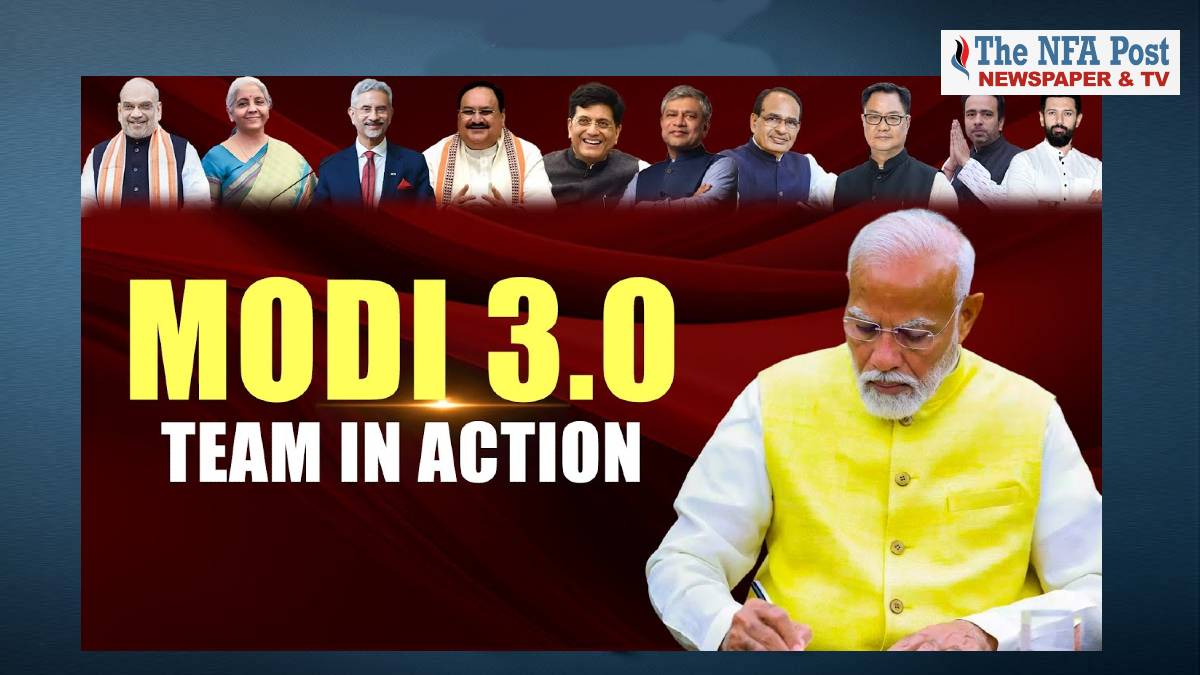This 2024, democracy will take centre stage globally, with parliamentary elections held in over 60 countries, representing at least half of the world’s population. Notably, major democracies such as India, the USA, Russia, the UK, and EU members are witnessing shifts in their political landscapes, impacting both domestic and international affairs.
India, the world’s largest democracy, just concluded its general elections with the BJP-led NDA securing 292 seats out of the 543 seats. This election was notably close compared to the 2019 elections, with the INC-led INDI bloc securing 234 seats. The night of June 9th concluded with the oath-taking ceremony, where President Droupadi Murmu administered the oath to the Prime Minister and the Union Cabinet.
Portfolio allotment
The recently elected union cabinet members have been assigned to their respective portfolios, with the incumbent ministers holding key positions. Amit Shah continues as Home Minister, Nirmala Sitharaman as Finance Minister, Rajnath Singh as Defence Minister, S. Jaishankar as External Affairs Minister, and Nitin Gadkari as Road and Highways Minister. This continuity aligns with Modi’s earlier plan, emphasising the continuity of policy initiatives and the vision for Viksit Bharat 47.
In addition, BJP allies have been entrusted with significant roles in the government. Ram Mohan Naidu from the Telugu Desam Party (TDP) has been appointed as Minister of Aviation, while HD Kumaraswamy of the Janata Dal (Secular) (JDS) has taken over the Ministry of Heavy Industry and Steel. Lalan Singh from the Janata Dal (United) (JDU) has been given the Ministry of Panchayati Raj, Fisheries, Animal Husbandry, and Dairying. These appointments reflect a strategic distribution of key portfolios to ensure balanced representation within the coalition government.
Federalism and coalition governments
The concept of federalism, aiming to encompass all societal elements in governance, has often remained more theoretical than practical in our country. Some argue that only coalition governments have the potential to effectively integrate federalism into national administration, bridging the divide between the centre and the states.
While coalition governments are acknowledged to be prone to instability and internal conflicts, hindering decisive policy-making, there’s a compelling argument for their utility in India’s diverse socio-political landscape. Despite challenges, coalition governments offer a platform to accommodate and cater to multiple ideologies and sections of society to better reflect the country’s pluralistic nature.
Historical context and economic reforms India has a history of impactful reforms under coalition governments. Notable examples include economic liberalisation during P.V. Narasimha Rao’s tenure (1991-1996) and accession to the World Trade Organisation under Atal Bihari Vajpayee’s leadership (1998-2004). These reforms propelled India into global competition and promoted fiscal discipline through measures like the Fiscal Responsibility and Budget Management (FRBM) Act.
| Coalition Government. Period. Average GDP Growth Rate (%) P.V. Narasimha Rao (Congress-led) 1991-1996 5.3% H.D. Deve Gowda & I.K. Gujral (United Front) 1996-1998. 5.0% Atal Bihari Vajpayee (NDA). 1998 – 2004 5.8% Manmohan Singh (UPA I). 2004-2009 8.4% Manmohan Singh (UPA II) 2009-2014 7.3% |
Interim budget vs full-fledged budget
The interim budget, presented before general elections, serves as a temporary financial plan to keep government operations and public services running smoothly. It allocates necessary funds for a few months without introducing significant policy changes, allowing the outgoing government to manage finances until the new government takes office.
In contrast, the full-fledged budget, prepared in July after the new government was elected, outlines comprehensive economic policies, revenue generation strategies, and expenditure plans for the entire fiscal year. This budget allows the new government to implement its priorities and long-term economic goals, providing a clear direction for the country’s financial and economic policies.
The US elections
The forthcoming US presidential election in November 2024 holds global significance, particularly for trade policies and geopolitical dynamics. Given the US’s role as the world’s largest economy, its election outcomes can impact global markets and diplomatic relations, including those with India.
Upcoming Union budget
The upcoming budget, anticipated in early July, will offer detailed insights into the government’s plans. As the BJP manifesto has been recommending, it is anticipated to prioritise economic growth through the creation of jobs, tax and financial reforms, ease of doing business, start-up funding, and infrastructure development.
Continuity in policies and goals due to political steadiness over a longer period is expected. This continuity is beneficial for financial and macroeconomic stability, resulting in good corporate earnings. Key sectors such as infrastructure, defence, railways, and PSU banks will remain in focus. Additionally, the government’s attention towards green energy, electric vehicles, semiconductors, and domestic production industries suggests progress in these areas.
Future policy and economic prospects
The BJP, lacking a majority, may face challenges in passing major policies and reforms, with coalition negotiations consuming critical time and resources. Market responses may remain subdued, with stakeholders hoping for long-pending reforms like the implementation of ‘labour codes’ and land acquisition laws.
Policy continuity with reforms is likely, focusing on investment-driven growth, infrastructure, manufacturing, and energy transition. PM Modi has reiterated his commitment to reforms and growth, emphasising previous achievements.
Addressing the fiscal deficit
The new government faces the significant challenge of addressing the rising fiscal deficit, which occurs when government expenditure exceeds income, necessitating borrowing. The interim budget presented in February 2024 outlined policies aimed at reducing the fiscal deficit from 5.6% in 2023-2024 to 5.1% in 2024-2025, and further to 4.5% in 2025-2026.
To offset the fiscal deficit, increasing government income through higher tax collections, enhanced exports of products and services, and other revenue sources is essential. Notably, two major income sources have contributed significantly: a record high GST collection of ₹2.10 lakh crore in April 2024 and a record high RBI dividend to the government, amounting to ₹2.1 trillion. These measures, if sustained and expanded, could help stabilise the fiscal situation and support the government’s economic agenda.
Public support and policy focus
The significant decrease in the BJP’s vote count underscores the necessity for the government to prioritise policies resonating with the general populace. Unlike past terms, decisions on sensitive issues such as religion, border conflicts, minority rights, the uniform civil code, and reservations will now require increased consultation with coalition partners. This heightened coalition influence could lead to more balanced policy decisions, addressing diverse demographic concerns and aligning with broader societal needs.
The recent election outcomes have left investors uncertain, contributing to a mixed market outlook. The absence of a single-party majority introduces risks, potentially resulting in fewer market-friendly policy decisions. Coalition dynamics may lead to delays and inefficiencies in policy implementation over the next few years. Additionally, the execution of previous policies, particularly those not directly impacting the economy, might face delays. Coalition pressures could also prompt appeasement of certain sections, further influencing policy directions.
Coalition and stock market
The reappointment of seasoned ministers is anticipated to bring stability and predictability, boost investor confidence, and potentially increase foreign and domestic investments. However, the challenges of coalition dynamics may introduce delays and inefficiencies in policy implementation, which investors will closely monitor.
A strong coalition is crucial for sustaining economic growth and business optimism. Continuity in policies and goals due to political steadiness over a longer period is expected to drive the stock market’s uptrend with lesser volatility. Investors will focus on sectors where the new government is expected to prioritise, such as infrastructure, defence, railways, PSU banks, green energy, electric vehicles (EVs), semiconductors, and domestic production industries. While the continuity of key government officials shows steadiness, success will depend on their ability to translate plans into actions that boost the economy.
NDA campaign manifesto
The BJP’s manifesto for the 2024 Indian election outlines key promises aimed at addressing critical issues facing the nation. Central to their agenda is the commitment to generate employment opportunities across sectors, reflecting the party’s focus on tackling unemployment and fostering economic growth. Additionally, the manifesto underscores plans to introduce a common civil code, signalling the party’s dedication to social and legal reforms aimed at promoting uniformity and equality in personal laws. Moreover, the BJP emphasises inclusive development, with a focus on empowering marginalised communities and enhancing social welfare programs to address socio-economic inequalities. Overall, the manifesto reflects the party’s vision for comprehensive development and reform, aiming to propel India towards a more prosperous and equitable future.
Upcoming state elections
In 2024, the Maharashtra, Haryana, and Jharkhand state elections are due. Due to this, there will be more emphasis on prioritising developmental work to showcase for the elections. Considering the ‘Freebie Zamana’ in the news, it wouldn’t be a surprise if the BJP also doles out some more freebies just to stay afloat in Maharashtra and Haryana and try to grab power in Jharkhand. The states might demand more recognition and funding for projects in the coming months and the centre might have to give in to attract voters in these states. On the other hand, having received a boost in performance from the Lok Sabha elections, the INDI alliance will also make a much stronger effort to win over voters.
At the end of the day, the risks, rewards, and limitations of not having a single party in power may have a significant influence on the socioeconomic climate of the country.

Trivesh D,
Chief Operating Officer, Tradejini





